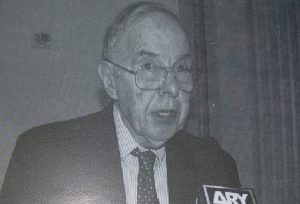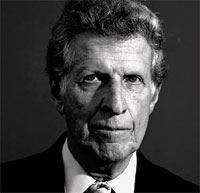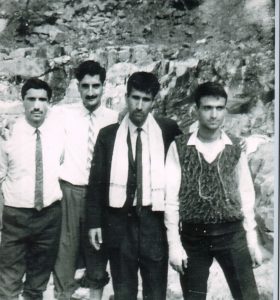Peace Watch » Editor's Take, Point of view » Howard Schaffer’s Kashmir Connection
Howard Schaffer’s Kashmir Connection
PUNCHLINE
Howard Schaffer’s Kashmir Connection
By
Z.G. Muhammad
 Small obituary notes published inside newspapers sometimes tell a big story. On past Monday, a few Srinagar based newspapers carried a two-column story with dateline Washington headlined, ‘American diplomat Howard Schaffer passes away.’ The news about his death had been confirmed on Twitter by Richard Rossow, who is a senior fellow and holds the chair for Centre for Strategic and International Studies (CSIS) Wadhwani Chair in U.S.-India Policy Studies.
Small obituary notes published inside newspapers sometimes tell a big story. On past Monday, a few Srinagar based newspapers carried a two-column story with dateline Washington headlined, ‘American diplomat Howard Schaffer passes away.’ The news about his death had been confirmed on Twitter by Richard Rossow, who is a senior fellow and holds the chair for Centre for Strategic and International Studies (CSIS) Wadhwani Chair in U.S.-India Policy Studies. 
‘Schaffer spent much of his 36-year career dealing with U.S. relations with South Asia. Most of the obituary notes read, ‘He had previously served as ambassador to Bangladesh, political counselor at American embassies in India and Pakistan. He was the author of biographies of two American diplomats who served as ambassadors to India at times when the US was deeply involved in efforts to resolve the Kashmir dispute.’ Interestingly, no obituary note mentioned about his Kashmir connection- an old hand in Washington on Kashmir. Interestingly, even mention was not about important book on Kashmir and writings- he profusely about the Kashmir Dispute and its resolution.
Kashmir since 1948, has been the fulcrum of the United States South Asia policy. It got involved in the dispute in a big way immediately after, New Delhi complained to the United Nations Security Council against Pakistan’s “aggression” on Jammu and Kashmir. Mobilizing its mission to the United Nations, its embassies in New Delhi and Karachi. It sent a clear brief to its permanent representatives in the United Nations Warren W Austin, a former Republican senator to plead that the ‘acceptable solution to all parties would be ‘a determination, probably by plebiscite. Its proactive role was discernible in all the UN resolutions on Kashmir even in the resolution no 1172 of 6 June 1996- twenty-four years after the India-China War that had seen a paradigm shift in Washington’s Kashmir policy. The resolution adopted by UNSC after India and Pakistan carried out nuclear tests called on the two countries to address the ‘root cause of tension in the region.’
For all the seventy years since birth of the Dispute Kashmir somehow or other has been creeping in Washington’s policy even after it de-hyphenated its relations with India and Pakistan. In January 2009, Holbrooke was appointed as a special adviser on Pakistan and Afghanistan, and Kashmir was also added to the portfolio. India protested, and to the exultation of New Delhi, Kashmir was pruned from his portfolio. That, Kashmir is a potential threat to peace in South Asia and also the gateway to peace in Afghanistan has become part of the psyche of US think tanks and diplomats. It gets manifest even in the half-taken initiatives, like the one in 2012 when Washington thought of appointing an expert in the political department of its embassy in New Delhi- the expert was expected to be a key figure of the State Department regarding matters relating to Kashmir. For New Delhi’s robust diplomacy, Washington had to drop many Kashmir related initiatives is a historical reality. Nevertheless, for the centrality of the Kashmir Dispute to US’s South-Asia policy, many an important American Experts including some former diplomats worked on Kashmir. Some eminent experts from Robert Wirsing to Stephen Cohen wrote profusely about the genesis of the problem. They also analysed dynamics of its perpetuation for peace in the region. Robert Wirsing’s two books ‘India- Pakistan and Kashmir Dispute’ and Kashmir in The Shadow of War’ are important readings for  students of India-Pakistan relations and Kashmir problem. Some years back, this concern was candidly summed up at an international conference on Kashmir in the Capitol Hill, Washington by Stanley Wolpert: “For South Asia, however, the future could either be a golden age of glorious growth and development in peace and harmony, or an area of disaster, darkened by the potentially deadly fallout of a nuclear war.”
students of India-Pakistan relations and Kashmir problem. Some years back, this concern was candidly summed up at an international conference on Kashmir in the Capitol Hill, Washington by Stanley Wolpert: “For South Asia, however, the future could either be a golden age of glorious growth and development in peace and harmony, or an area of disaster, darkened by the potentially deadly fallout of a nuclear war.”
Notwithstanding, Kashmir problem largely having ceased to be on the international radar screen continues to be subject to the academia, think tanks and experts in the USA. Of all the important US experts on South-Asia Howard Schaffer was one who remained obsessively involved in Kashmir till his end.
His connection to Kashmir dates back to 1964, Holy Relic Movement. He, then a young diplomat working as the second secretary arrived in Srinagar during 13 days complete shutdown against stealing of Moi-e-Muqaddas from the Hazratbal Shrine. He was accompanied by an American journalist Richard Critchfield, then a correspondent for Washington Evening Star and Herald Tribune. ‘It was he who reported for the first time the theft of the holy relic from Hazratbal for the international media. The duo along with Farooq Kathwari (now a top businessman in the USA) appeared on the stage at a public meeting at Khanyar,  Srinagar. Farooq Kathwari introduced them to then firebrand student leader Anwar Ashai, who conducted them to different parts of the city and other towns to have a feel of the situation. Later on whenever Shaffer visited Kashmir, for knowing about the ground situation he banked on Ashai then General Secretary of Jammu and Kashmir Students and Youth League. He was posted in New Delhi when Chester Bowels was US Ambassador in New Delhi for the second time. To quote A.G. Noorani, ‘He received his baptism as Kashmir expert when he was deputed in 1964 to pay an official visit to the State by Ambassador Chester Bowles.’ His closer interactions with the Kashmir youth leadership had enabled him to understand the ground realities and gauge the public sentiment.
Srinagar. Farooq Kathwari introduced them to then firebrand student leader Anwar Ashai, who conducted them to different parts of the city and other towns to have a feel of the situation. Later on whenever Shaffer visited Kashmir, for knowing about the ground situation he banked on Ashai then General Secretary of Jammu and Kashmir Students and Youth League. He was posted in New Delhi when Chester Bowels was US Ambassador in New Delhi for the second time. To quote A.G. Noorani, ‘He received his baptism as Kashmir expert when he was deputed in 1964 to pay an official visit to the State by Ambassador Chester Bowles.’ His closer interactions with the Kashmir youth leadership had enabled him to understand the ground realities and gauge the public sentiment.
It was for his initial grounding that he had got proactively involved in the Kashmir Study Group founded by an American Kashmir born businessman Farooq Kathawari. The Group that included academics and foreign policy specialists was ‘convinced that the dangerous and tragic situation in Kashmir called for fresh efforts to break the deadlock’. One would not completely agree with the Kashmir Study Group or Schaffer’s ideas about the resolution of the Kashmir Dispute but it was one of the major initiatives that with the involvement of some top men including Congress men had brought Kashmir back into sharp focus in Washington. Schaffer also got involved in other Kashmir related activities organized by KAC an important Kashmir Diaspora organization in Washington.
His biggest contribution besides some exhaustive papers on the Kashmir problem has been his book, ‘The Limits of Influence, America’s Role in Kashmir’. It is an insider’s view about Washington’s policy about Kashmir – which in fact has largely been consistent in as much as recognizing aspirations of people of the state.
Schaffer, for his book and its importance to history and narrative of the problem, will continue to be referred to by scholars in their works on Kashmir.
27- 11-2017
Filed under: Editor's Take, Point of view







